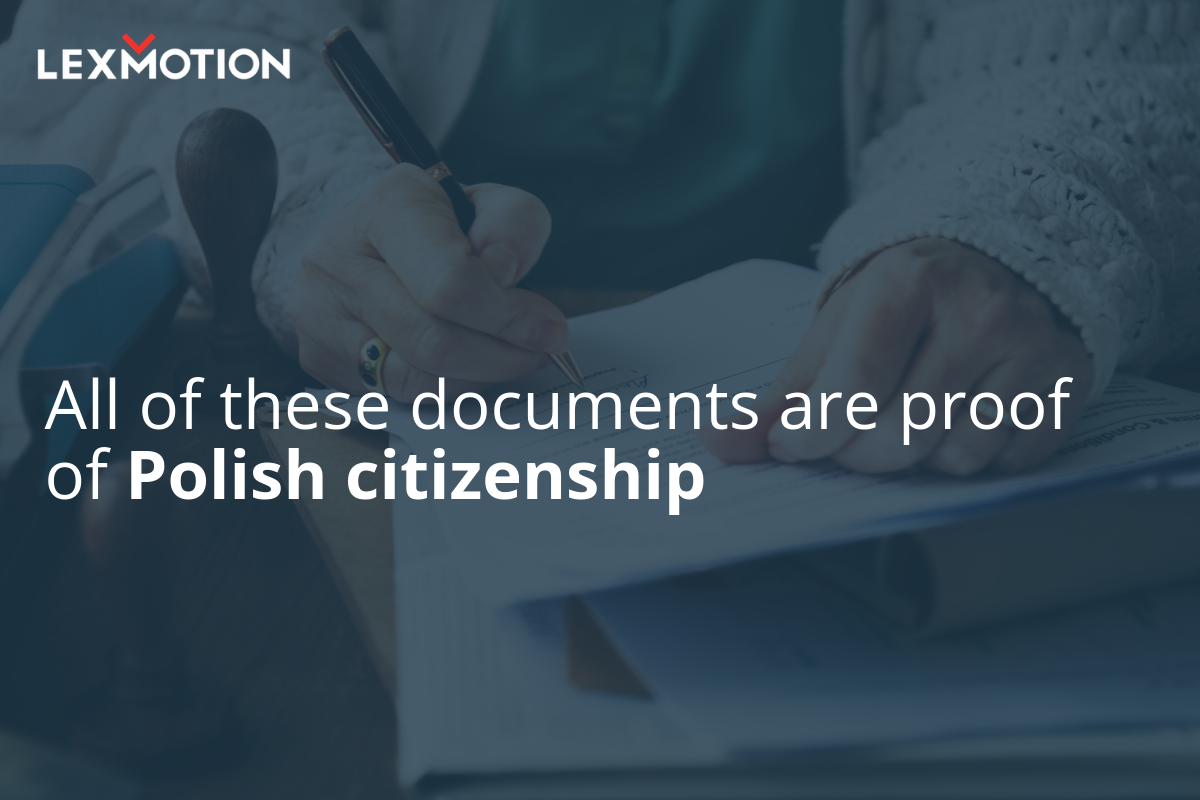Polish roots? If you wish to benefit from Polish citizenship by descent and get a secondary Polish passport, you’ll need to gather a few documents to prove it. Be prepared to dig deep but don’t worry–if needed, we can dive into the Polish archives for you or point you in the right direction.
If you have a grandparent, parent or other relatives in your direct bloodline that has or had the Polish citizenship, you may be eligible for obtaining Polish citizenship too. Thanks to the Polish citizenship law, even people who have never spent a day in Poland nor speak a word of Polish might be able to benefit from the perks of being an EU citizen.
Your Polish Passport Could Be The Key That Unlocks Many Doors
 There are many advantages to enjoy with a secondary Polish passport. Perhaps you’d like to experience smoother traveling when you’re visiting Europe? Apply for a job in any of the EU member states? Move to a European country? Study abroad? Or expand your business?
There are many advantages to enjoy with a secondary Polish passport. Perhaps you’d like to experience smoother traveling when you’re visiting Europe? Apply for a job in any of the EU member states? Move to a European country? Study abroad? Or expand your business?
Whatever your reasons for your interest may be, one thing is certain: this passport can open many doors for you. And we speak from experience, as we’ve helped thousands of people from Polish descent claim their Polish citizen rights and passports over the past decade.
Below, we list the 12 steps you need to take in your secondary Polish passport application according to the Polish citizenship law. Unsure or confused about any of them? Lexmotion is happy to answer your questions and offer assistance. We can guide you through the entire process as listed below, check if your documents are valid, help you locate additional files if needed, and organize the required translations and correspondence in Poland.
Want to discover if you meet the Polish citizenship requirements first? Take our free quiz first and find out.
https://www.facebook.com/lexmotion.eu/videos/599254077147104/
Step 1: Complete One Polish Document Confirming Polish Citizenship Of Your Ancestor
There are several documents that can prove the Polish citizenship of your ancestor(s) and you will need at least one of them to start with your application. These documents may be found in your own family archives or in the archives in Poland.
Valid documents are an expired Polish ID card (dowód osobisty), a Polish passport (Polski paszport), a registration card (karta meldunkowa), a book of military records (zeszyt ewidencyjny) or a re-emigration registration card (karta rejestracyjna reemigracyjna) from your ancestor(s).
Since all of these documents are proof of Polish citizenship, they will help you with your case.
There are also some auxiliary documents that can help you in the process of recreating your family’s history. You may come across a Union of Poles card, for instance, a certificate of receipt of Virtuti Militari (Poland’s highest military decoration for heroism and courage in the face of the enemy at war) or perhaps a certificate of being a prisoner of war. However, as these documents were either provided at times of war (under difficult circumstances) and/or abroad, they will not be considered full proof of your ancestor’s Polish citizenship.
When we carry out the procedure for you, Lexmotion can help you get hold of the required documents. All we would need is some basic data about your family. You can check if you’re eligible for the procedure with our free and confidential quiz here.
Step 2: Gather (Non-Polish) Vital Records That Prove Your Bloodline
The next step in the application process for your Polish passport consists of collecting documents proving kinship. These documents recreate your family ties with at least one Polish ancestor. This is obviously needed to confirm your Polish citizenship by descent.
Documents that prove your bloodline are vital records such as birth certificates, marriage certificates or licenses, and death certificates. These records are obtained easily because governmental authorities of every country keep these files, since they are basic tools to manage the data of the population.
Usually, if you weren’t born in Poland, the documents proving kinship are non-Polish. But if you do have any Polish birth or marriage certificates in your family archives, these are very helpful too. And if not, we can find them in the Polish archives for you.
 An example how vital records can prove your family ties: if you possess the death certificate of your grandfather, the marriage certificate of your parents, and your own birth certificate we get the entire kinship in two generations perfectly described.
An example how vital records can prove your family ties: if you possess the death certificate of your grandfather, the marriage certificate of your parents, and your own birth certificate we get the entire kinship in two generations perfectly described.
Polish birth certificates can have the following titles: “Odpis skrócony aktu urodzenia,” “Odpis zupełny aktu urodzenia,” “Wyciąg z aktu urodzenia,” or “Świadectwo Urodzenia.” If you’re looking for a Polish marriage certificate, it could be called “Metryka Zawarcia Małżeństwa,” “Akt Ślubu” or the German “Heiratsurkunde” (as Poland regained independence in 1918). Lexmotion can help you locate the vital records you need.
Step 3: Appoint A Contact Person With An Address In Poland
In order to process all the needed files in Poland, you’ll need to appoint a local point of contact who will receive correspondence on your behalf. Lexmotion can help you with this too.
Step 4: Order Sworn Translation Of All Non-Polish Documents
All non-Polish documents that are Polish passport requirements in this process need to be translated by a sworn translator. Sworn translators are enlisted by the Polish government and there are some costs involved.
Step 5: Pay Duty Stamps For Polish Authorities
Once all documents have been correctly translated, the payment of stamp duty is due. Paying stamp duty is compulsory for your Polish passport application and to register your birth and/or marriage certificates in Poland.
Step 6: Fill Out An Application For Polish Citizenship Confirmation
The application for Polish citizenship confirmation needs to be completed in Polish.
Lexmotion can help you complete the form.
Step 7: Submit Your Application For Polish Citizenship Confirmation
Once all documents have been collected and application forms have been completed, the package with all required documents needs to be delivered to the Provincial Office in Warsaw, Poland.
Step 8: Register Birth/Marriage Certificates In Poland
A Polish passport can only be issued on the basis of a Polish birth certificate. If you were born outside of Poland, your birth certificate needs to be registered at a Polish department, called a Polish registry office (Urząd Stanu Cywilnego). If you’re married abroad, the marriage certificate also needs to be registered in Poland.
Step 9: Submit Additional Documents Upon Request
In some cases, the Polish authorities ask for clarification or additional documents based on the information provided in the application.
Step 10: Receive Administrative Decision Of Provincial Office In Warsaw
After all documents have been well received by the authorities in Poland, you will receive the administrative decision that confirms your Polish citizenship. We call this the Polish Citizenship Certificate.
Your point of contact in Poland can collect the certificate in person or the Provincial Office in Warsaw can send it to your address of correspondence in Poland. If Lexmotion handles your case, we’re the ones who will collect it and make sure it is well received by you.
Step 11: Complete Polish Passport Application And PESEL Number Application Forms
PESEL is the Polish national identification number which consists of 11 digits. It is one of the Polish passport requirements. You can not get a passport or ID card without this number. Both the application form for your passport and the one for your PESEL number need to be completed in Polish again.
Step 12: Apply for Our Polish Passport And Pay Passport Fee
The last step will be the only one that requires you to leave the house: requesting and collecting your secondary Polish passport at your local consulate. Now, you can start enjoying the benefits of being an EU citizen!
Ready to start with step number one of your secondary passport application? There are many benefits of Polish citizenship you could enjoy with it, including all EU citizens’ rights and privileges. Take our short, free, and confidential quiz to find out if you’re eligible to get your own Polish passport.




[…] following five types of benefits of Polish citizenship might make you wonder why you haven’t claimed your secondary EU passport […]
[…] The only thing that’s vital is that one of your family members (in direct line) ever possessed Polish citizenship during their lifetime. If so, you’re already halfway through the process and there are only a few steps left you need to take. […]